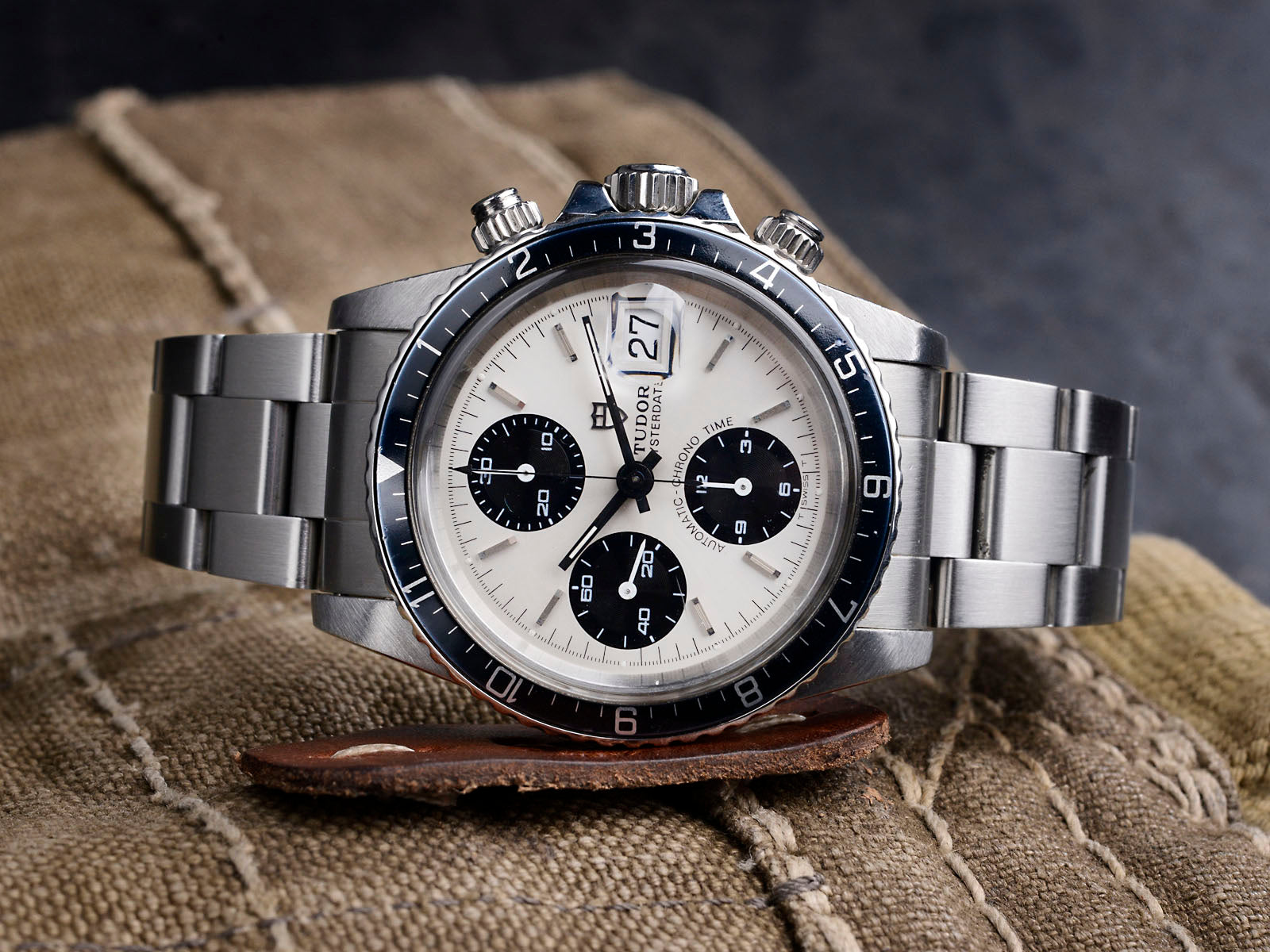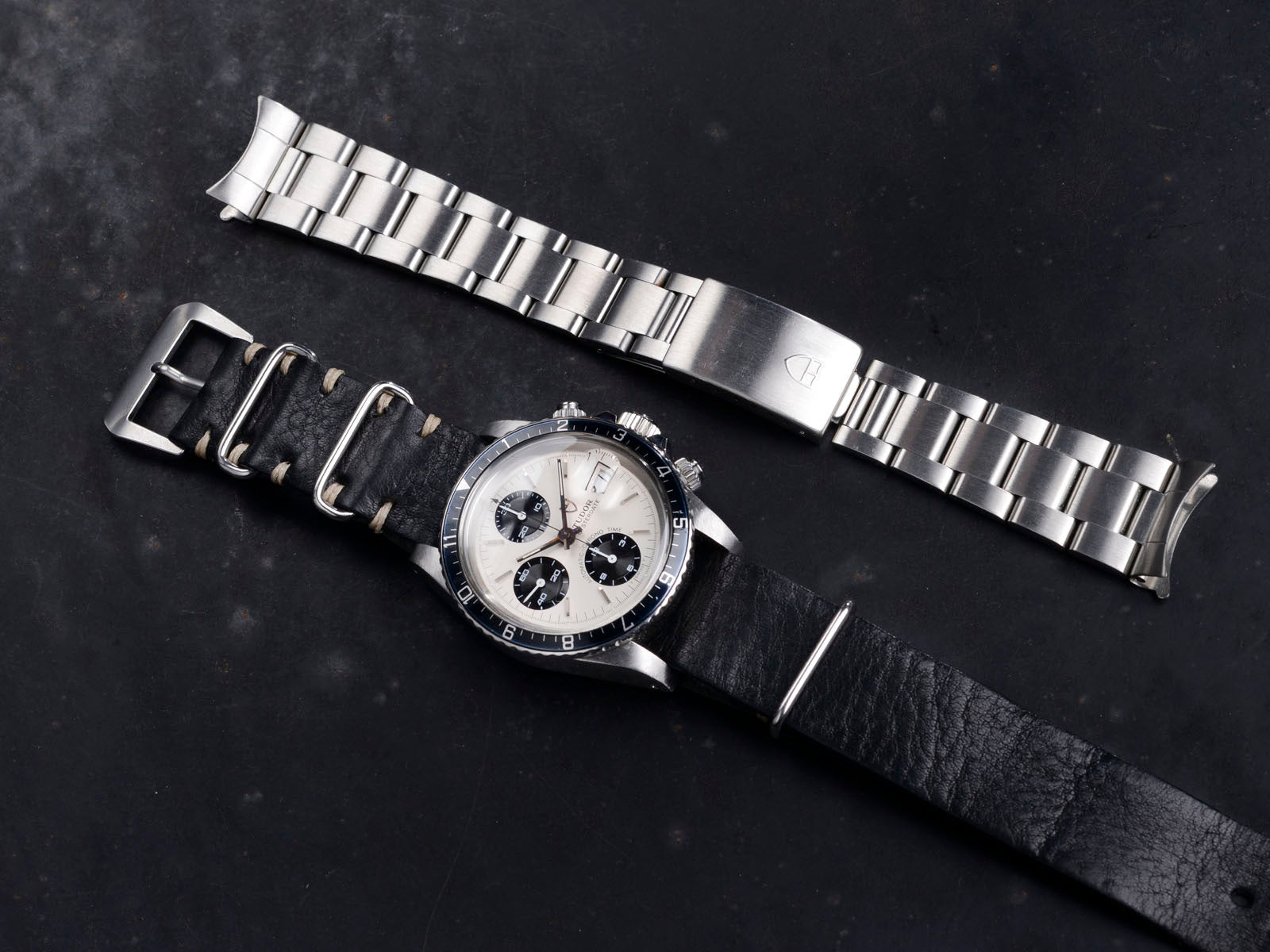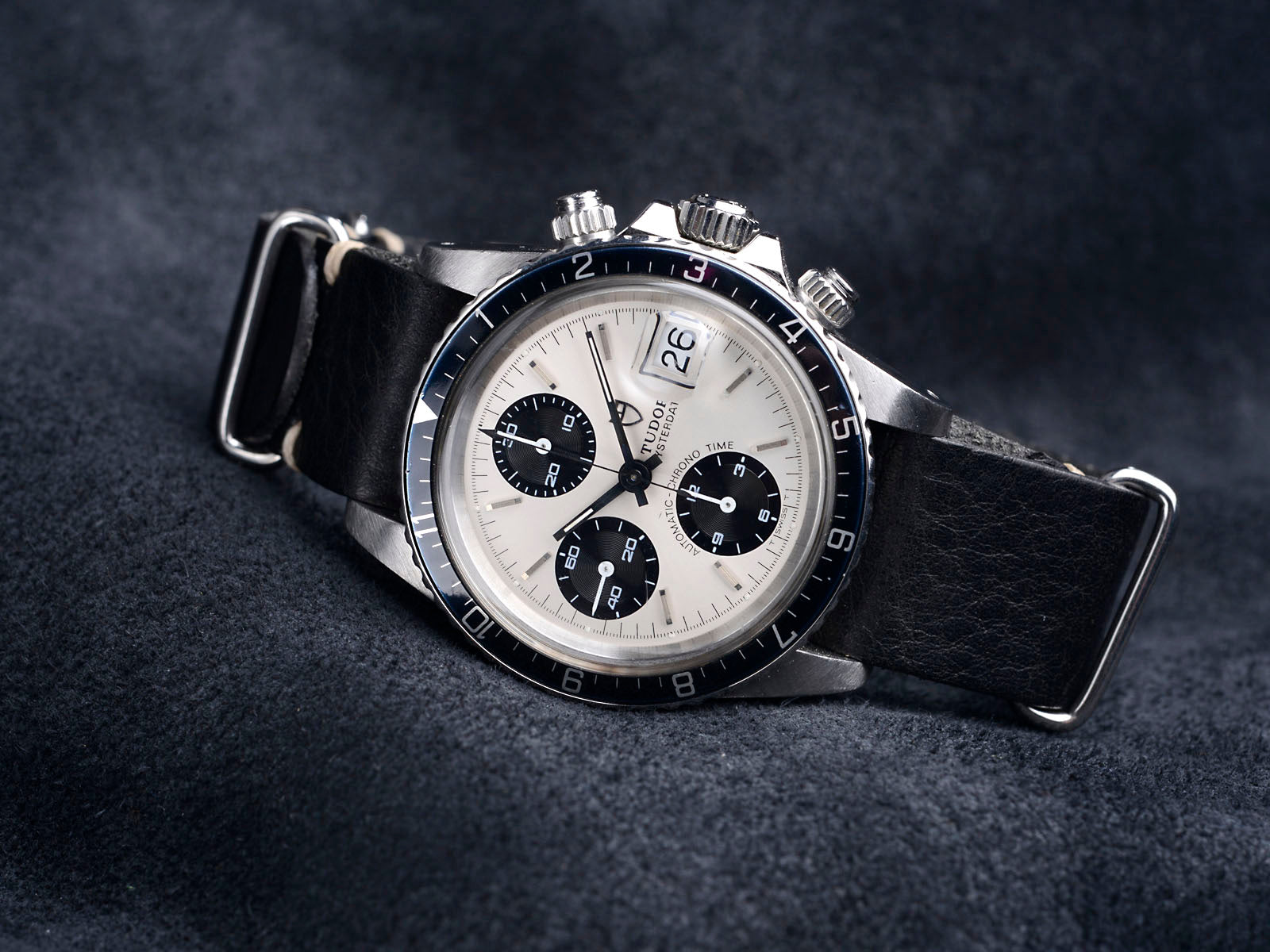
The Tudor Big Block
A great watch to wear…
I have always been a fan of Tudor sports watches and the chronograph watches from the ‘plex-era’ of Tudor’s history offer the lover of cool vintage watches the opportunity to wear a watch that has a great presence on the wrist, due to its substantial size and choices of dial and bezel combinations. At Bulang & Sons we love wearing these watches on vintage leather straps or a rare limited edition signature nato strap. There is a lot of interest in the earlier two-register chronos which are iconic amongst Rolex and Tudor collectors, especially the legendary ‘Homeplate’ chrono from the early 1970s. Bothe the ‘Homeplate’ and ‘Monte Carlo’ watches have also been relaunched as part of Tudor’s Heritage line over the past four years. There three register chronos could e viewed as the forgotten watch, the unsung hero but I would argue that it is one of the most innovative and exciting watches from the Tudor stable. Let’s explore more…
Early chronographs…
The Tudor chronograph went through four significant versions throughout the 1970s to late 1990s. Unlike now, where production of watches is consistent and strictly controlled, the 70s and 80s (and in preceding decades) witnessed small variations in production runs that make collecting vintage watches so much fun. Tudor’s first foray into chronographs was in 1970 with the launch of the 7000 series. These watches featured the calibre 7734 manual wind movement and a large size case for a chronograph of that era – 39mm. The distinctive dials were the beginning of Tudor’s signature use of colour in their chronograph watches, this first one being the Homeplate dial – so called due to the hour markers resembling the home plate on a baseball field. These watches were a commercial success and were quickly followed in 1971 by the launch of the second series of chronos, the 71X9 watches. These were again manual wind watches with two chronograph registers, but were equipped with a bester quality movement the Valjoux 234. These watches were, again, a big commercial success and it was this series of watches that launched the famous collectors’ term Monte Carlo – due to the dial’s resemblance to a casino roulette wheel. The first two series could easily warrant a full article on each, but it is the third series that we are focusing on here – the Big Block chronos.

The birth of the Big Block…
The third series of chronographs were a big leap, in terms of innovation, for Tudor. First introduced in 1976, the most obvious visual difference was the introduction of a third chronograph register on the dial – an hour indicator. This was facilitated by the introduction of a new movement – the Valjoux 7750 which also allowed the introduction of the quick-set date feature too. The biggest development, however, was the introduction of an automatic movement making these watches the first self winding chronographs from the Wilsdorf group and over a decade before Rolex introduced their first automatic Daytona chromo. This was a huge coup for Tudor and put them at the forefront of swiss chronograph manufacture. The presence of the self winding mechanism and rotor menat that the watch case need to be made a little deeper, which resulted in the collectors’ term Big Block. In fact, until the introduction of the Seadweller Deep Sea, it was the biggest watch to come from the Wilsdorf stable.
Making it big for two decades…
The Big Block watches lasted for two generations the 9400 series and the 79100 series and ran from 1976 until 1995/6. As with the preceding 7100 series, the 9400 consisted of three different references that were distinguished by the three different bezel variations:
9420 – Plastic ‘bakelite’ tachymeter (as per the 7031 and 7149 previously)
9421 – 12 hour calibrated bi-directional bezel
9430 – Steel tachymeter scale bezel
All the chronographs in Tudor’s vintage collections featured a date and were given the moniker Oysterdate and all the first two series watches featured this on the dials. The third series chronos were also listed as Oysterdates, but the very earliest dials only featured the words ‘Chrono Time’ or ‘Automatic Chrono Time’ in an arc over the bottom chrono register.
Different dials, with different styles…
For the purposes of this article, I am going to spilt the watches into two dial types – Monte Carlo and Regular. With the introduction of the third series of chronos came the use of a more understated ‘Daytona-esque’ dial; most commonly either black with silver/white subdials or vice versa. These regular dials featured applied hour markers, with beveled/sloping ends. The date aperture had a painted window around it and the chrono registers had a raised inner section which gave the dial a two-dimensional quality. This regular dial version endured throughout the entire near 20 year run of the Big Block (and into the fourth series of chronographs – the 79200 series) and featured only small variations. By the time the 79100 Big Block was released the regular dials all featured the ‘Oysterdate’ and ‘Automatic – Chrono Time’. Later 79100 series dials had straight (non-sloping) applied hour markers and the painted window around the date aperture disappeared. The regular dial watches also had a new hand set, with an ‘arrow’ chrono hand whilst the Monte Carlo Big Block watches kept the orange centre sweep chromo hand from the 7100 series watches.

Monte Carlo…
As part of the 9400 series Big Blocks, Tudor also continued to produce exotic dials that were heavily influenced by the dials in the 7000 and 7100 series watches. Collectors also refer to these dials as the three register Monte Carlos. There were two types of Monte Carlo dials, a version with painted hour markers that were very reminiscent of the 7100 series watches and a version with applied hour markers. The dials with applied hour markers were only available as a black dial with white ‘exotic’ sub dials and orange numbers on the minute track. This dial was featured in the 9420 watch (with a black plastic tachymeter bezel) and the 9430 (with stainless steel tachymeter bezel). The dials with painted hour markers were available in two colour ways – grey/black/orange and grey/blue/orange. Both dial colours were available in all three references. The black version was always teamed with a black tachymeter or 12-hour scale bezel and the blue dials with blue versions of the bezels. These watches are now very rare and are sought after by collectors, especially the blue 9420.
The last plexi chronos…
In the late 1980’s Tudor replaced the 94300 series watches with the 79100 series, which kept the same Big Block case, but only came with the regular dial configuration. Again, there were three references which were all differentiated by their bezel type:
79160 – Black plastic tachymeter bezel
79170 – Black graduated 12 hour bi-directional bezel
79180 – Steel tachymeter bezel

Over the past few years and number of prototype dials have been discovered for the 79100 series watches. These have all been silver dials with different cloud sub dials – including blue, orange pink and green. None of these made it to production, but are interesting to collectors of the Big Block watches.
A ‘Big’ winner…
We believe that these watches are one of the best value vintage chronographs available. The regular dialled watches have classic understated styling and work brilliantly on a vintage strap or nato strap as a cool weekend watch or equally on the original heavy Oyster bracelet with a suit or in your vintage sports car. The Monte Carlo dialled watches are iconic and are some of the coolest chronos that you can wear. The additional case size makes these watches feel contemporary too. Whilst we are happy that the modern trend towards big watches is now over, there is something very reassuring about the heft of the Big Block that you don’t get with other chronographs from the same era. All in all, we think this classic Oyster is a real winner!
Bulang & Sons




















